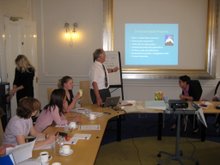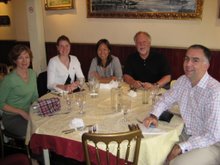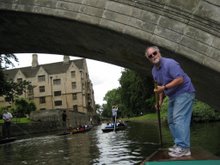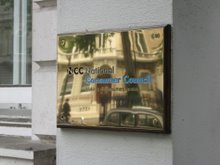London Diary 11 July 2007
Day 12 (with some references to days 6 and 7)
Catching up……
It’s time I dealt with catching up with my journal of events—especially those dealing with some meetings and site visits Brighton and Dudley.
I attended NSMC meetings on July 4th, 10th and 11th on various topics. The organization is quite impressive and reflects in both the content and the conduct of the various meeting. For staff meeting, the chair rotates from person to person—given people leadership experience and a shift in the ambience of each meeting.
The social marketing effort is organized into six different programs—each headed up by a key staff person:
1 – Practitioner development, support and events
2 – Government interventions, technical assistance and support
3 – Standards development, innovation and learning
4 – Communications, resources and events
5 – Research, intelligence and insight
6 – Health inequalities
The meetings are divided into parts such as: standing items, climate scan/intelligence, upcoming meetings/events, update reports (on each of the 6 program areas) and other items. The interaction makes for good discussion of new items and updating each other on a broad range of activities. I found them to be quite interesting and informative. Of course, I still have a lot to learn about the overall project and my participation in the meetings really helps.
I also attended a meeting of the National Social Marketing Standards Development Steering Group. By “standards” it means competencies and certifications for social marketing. One of the representatives from the MSSSB (Marketing and Sales Standards Setting Body) reported on preliminary efforts to develop standards for social marketing. My understanding is the MSSSB is the lead agency for such development, given its charter regarding professional standards (see below)
The MSSSB was established by the Department for Education and Skills (DfES) in September 2001 in order to develop world-class benchmarks of best practice for the Marketing, Marketing Communications, Sales and Telesales occupational areas. The benchmarks will form the basis for all Government funding of Marketing and Sales related courses. MSSSB will work with key stakeholders to help develop a national educational and training framework that support these professions. http://www.msssb.org/
One of the staff also prepared a nice draft table that cross-walks the NSMC benchmark criteria (http://217.154.246.74:8209/images/CoreFiles/BenchmarkCriteriaTOOLDec2006.pdf) and 10-point checklist with key standards, organizational policies and references in the literature (e.g. Ed Maibach’s People and Places, BMC Public Health c.2007). It made a very systematic link between the NSMC framework for social marketing and both the literature and the regulatory bodies.
n.b. Maibach’s article has a great bibliography and makes a very useful observation about social marketing in the US. “Much of what is called ‘social marketing’ by practitioners and academics is not marketing, however, because neither products nor services are developed, distributed, or promoted. Rather, most of what is referred to as social marketing in public health involves exclusively the provision of information, and is therefore more correctly characterized as communication.”
There were many other useful discussions during this meeting—too many to go into here. Clearly, there is an emphasis on building partners at all levels of government, community and academia. Also I met Dr. Sue Peattie, from the marketing department at Cardiff Business School, Wales. Among many other publications, she and her husband wrote an article in 2003 about reducing social marketing’s dependence on commercial marketing theory (Marketing Theory, Sep, 2003).
After this discussion, I recommended that the group consider the larger context of public health in the standards (competencies) process—such as the 7 areas of health education competencies developed by the National Commission for Health Education Credentialing (NCHEC) www.nchec.org. It would be a way of assuring the public health expertise as well as the social marketing expertise of the workforce.
###
Tuesday, 17 July 2007
Subscribe to:
Post Comments (Atom)































No comments:
Post a Comment